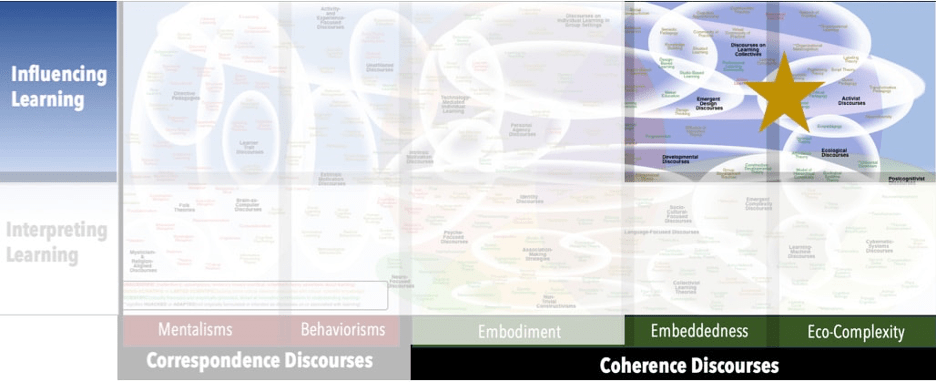AKA
Atmosphere of Learning
Climate of Learning
Teaching Environment
Focus
Interrogating assumptions that frame educational practicePrincipal Metaphors
Learning Environment is a discourse that asks educators to be attentive to underlying and implicit metaphors, and so it is inappropriate to align it with a specific cluster of associations.Originated
1990sSynopsis
Learning Environment is an umbrella notion that reaches across all aspects – philosophical, cultural, social, disciplinary, operational, physical, and so on – of a situation intended to support learning. It appears that the notion was developed to alert educators that a wide range of considerations is necessary to understand the assumptions on learning, learners, knowledge, and teaching that are being enacted in any given setting. Associated constructs and discourses include:- Constructivist Learning Environments (David Jonassen, 1990s) – a mashup of teaching emphases and methods indexed to Non-Trivial Constructivisms and Collectivist Learning Theories. Foci include ill-structured problems, meaningful tasks/projects/cases, worked examples, learner choice, supports for collaboration, and teacher modeling.
- Effective Learning Environments (Organisation for Economic Cooperation and Development, 2000s) – a mashup of teaching emphases and methods aimed at Deeper Learning and assembled from both evidence-based practices (e.g., formative assessment, modeling of effective learning habits) and popular-but-problematic trends (e.g., student-driven curricula, learning styles)
- Innovative Learning Environments – a mashup of Learning Environments, Technology-Mediated Individual Learning, and Activity- and Experience-Focused Discourses, usually articulated in related to “21st-century skills” (see Deeper Learning).
- Learning Space (Learning Setting) – This subdiscourse of Learning Environment is specifically concerned with the physical settings in which teaching and learning happen – indoor or outdoor, actual or virtual, synchronous or asynchronous. That said, the discourse is dominated by assumptions of indoor, actual, and synchronous encounters, and so Learning Space tends to be preoccupied with such matters as physical comfort, aesthetics, lighting, acoustics, and technology.
- Open Learning Environments (Michael Hannafin, Susan Land, Kevin Oliver, 1990s) – a mashup of insights distributed across Discourses on Individual Learning in Group Settings, including emphases on self-directed inquiry, heuristics-based learning, ill-defined problems, metacognition, and collaborative engagements
- Place-Based Education (Pedagogy of Place; Community-Based Education; Place-Conscious Education) – This discourse is both an educational philosophy and a pedagogical approach that uses socio-geographical locations (deliberately inclusive of all their cultural, historical, and geophysical aspects) as a “partner” in formal education – that is, as a focus of inquiry, a source of curriculum, a dynamic teacher, and an active agent in the more-than-human world. (See also Third Teacher, under Alternative Education.)
- Powerful Learning Environments (Erik De Corte, 1990s) – a mashup of teaching emphases and methods indexed to Non-Trivial Constructivisms (e.g., Metacognition, Self-Regulated Learning, Meaningful Learning) aimed at creating optimal conditions for Deeper Learning, especially for disadvantaged students
- Constructivist Learning Environment Survey (Peter Charles Taylor, Barry Fraser, 1990s) – a 20-statement student questionnaire to assess the extent to which a constructivist epistemology is enacted within a classroom environment
- Reformed Teaching Observation Protocol (Daiyo Sawada, 2000s) – a 25-item protocol, looking across lesson design, content, and classroom culture, intended to assess the extent to which “reform” sensibilities (i.e., ideas rooted in Non-Trivial Constructivisms)
Commentary
In effect, Learning Environment is a discourse that calls educators to be mindful of the ranges of discourses that might be at play in their beliefs, attitudes, and practices. Phrased differently, Learning Environment might be construed as a metadiscourse, with very much the same intentions as this website – namely, to highlight that there are not “neutral” structures or “innocent” practices, and to assert that educators have some level of obligation to attend to the assumptions and belief systems that they act out.Authors and/or Prominent Influences
DiffuseStatus as a Theory of Learning
Learning Environment asserts that all educational practice is oriented by practitioner beliefs, learner assumptions, physical settings, cultural expectations, and so on. That assertion prompts the conviction that, while Learning Environment is not itself a theory of learning, teachers and policy makers have an ethical obligation to be attentive to the principles and theories of learning that they enact in their practice.Status as a Theory of Teaching
Learning Environment is all about teaching – that is, it is intimately concerned with why teachers teach the way they teach. However, it is better construed as a metadiscourse on educational practice than a theory of teaching.Status as a Scientific Theory
The literature around Learning Environment is wildly varied, ranging from uncritical treatments that draw on Folk Theories to deeply critical accounts that are indexed to Cognitive Science (and other robust discourses). Because of this variety, it is coded here as not entirely scientific.Subdiscourses:
- Constructivist Learning Environments
- Constructivist Learning Environment Survey
- Effective Learning Environments
- Innovative Learning Environments
- Learning Space (Learning Setting)
- Open Learning Environments
- Place-Based Education (Pedagogy of Place; Community-Based Education; Place-Conscious Education)
- Powerful Learning Environments
- Reformed Teaching Observation Protocol
Map Location

Please cite this article as:
Davis, B., & Francis, K. (2024). “Learning Environment” in Discourses on Learning in Education. https://learningdiscourses.com.
⇦ Back to Map
⇦ Back to List
